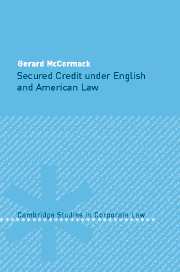Book contents
- Frontmatter
- Contents
- Preface
- List of abbreviations
- 1 The essence and importance of security
- 2 Security rights under English law
- 3 An overview of Article 9 of the Uniform Commercial Code
- 4 Implications of Article 9-type reforms for the English law of security interests
- 5 Notice filing versus transaction filing
- 6 Retention-of-title clauses under English law and Article 9
- 7 Receivables financing
- 8 Security interests in deposit accounts, investment property and insurance policies
- Appendix: Article 9 of the Uniform Commercial Code
- Index
1 - The essence and importance of security
Published online by Cambridge University Press: 23 July 2009
- Frontmatter
- Contents
- Preface
- List of abbreviations
- 1 The essence and importance of security
- 2 Security rights under English law
- 3 An overview of Article 9 of the Uniform Commercial Code
- 4 Implications of Article 9-type reforms for the English law of security interests
- 5 Notice filing versus transaction filing
- 6 Retention-of-title clauses under English law and Article 9
- 7 Receivables financing
- 8 Security interests in deposit accounts, investment property and insurance policies
- Appendix: Article 9 of the Uniform Commercial Code
- Index
Summary
This book compares and contrasts American and English approaches towards the recognition and enforcement of security interests in personal property. United States law is found almost exclusively in the Uniform Commercial Code (UCC), whereas English law is derived from a variety of sources, both statutory and non-statutory. If one could compare the two systems in a word, one might say that the US approach is functional whereas the English approach is pragmatic though the overall tendency is to be facilitative and enabling. There are almost no limits on the category of assets that may be used as security, and the procedures for the creation of security interests are quite flexible and informal. The law is pragmatic rather than functional, as transactions that serve the same economic ends are often visited with different legal consequences. The latter state of affairs has attracted criticism but so far the legislature has resisted efforts to recast English law along the lines of Article 9 of the US UCC. Article 9 attempts to apply similar rules to all transactions that in economic terms are intended to serve as security. Moreover, Article 9 embodies a near-comprehensive registration obligation, i.e. public notice of security interests must be given.
- Type
- Chapter
- Information
- Secured Credit under English and American Law , pp. 1 - 38Publisher: Cambridge University PressPrint publication year: 2004



